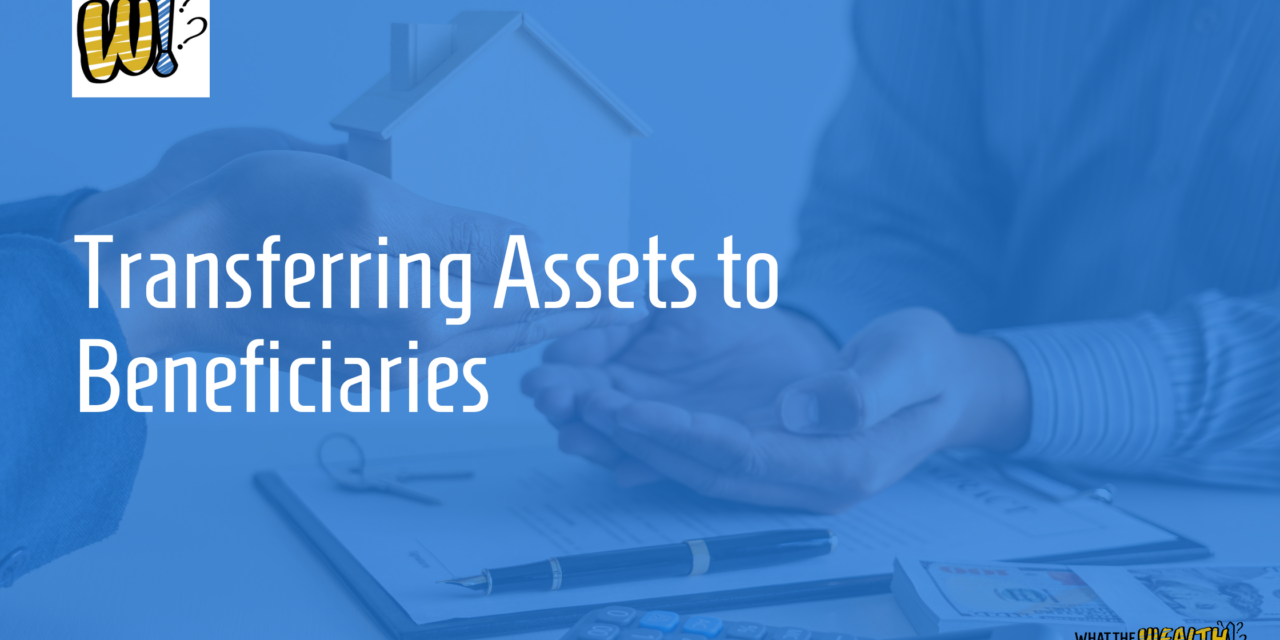What The Wealth Ep #81: Transferring Assets to Beneficiaries
Sometimes parents want to hand down assets to their children or other beneficiaries before they pass away for various reasons. Perhaps they want to see their children enjoy the assets, or maybe they no longer want to deal with managing them.
Whatever the reason, there are right ways and wrong ways to transfer assets to beneficiaries, and that’s what we’ll discuss in Episode 81 of the What the Wealth Podcast.
Generational Differences
Last week some clients with aging parents came in to meet with me. The mother is 85, and the father is 89. They’ve done well over their lives, building and accumulating assets. They’d done even better at saving assets, always living very frugally, and would like to start passing down assets to their three children soon.
I see this often with clients or parents of clients in the 75-100 age range. They either grew up during The Great Depression or had parents who did, and it shaped their relationship with money. They tend to be extremely frugal, almost making a game of how little they could spend.
This is much different from today when many people prioritize work-life balance and living for today. This attitude can carry a lot of risk; people often get close to retirement without having saved nearly enough.
Preserving Cost Basis
My client’s parents own six rental properties and have three children. They want to gift two rental properties to each of their children. There are a few problems with this plan.
The rent on these properties has not been increased for more than five years. The parents feared they would lose good tenants by raising the rents, so the properties are priced well under what their local rental markets are commanding. That is money being left on the table.
We looked up the original purchase prices for the homes which were bought in the 1980s. Each house was purchased for around $40,000 and is now worth between $300,000 and $400,000, so the rental income has paid for these homes many times over. But the parents are tired of dealing with them; Dad, who remember is 89, is still coming in person to collect rent checks, so they want to gift them to their children.
This is a mistake. If those homes were gifted now, the current cost basis is carried over to the new owners, the children. The parents paid $40,000, and the houses are now worth $400,000. Assets gifted see the cost basis, in this case, $40,000, carried over to the new owners.
The Impact on Taxes
If the kids sell the homes, they will pay capital gains on them. They sell at $400,000; the cost basis is $40,000, with a capital gains rate at around 20%.
A $360,000 profit with 20% capital gains means $72,000 goes to the IRS. In states that have state-level capital gains, that cut will be even larger.
If the houses are passed down once the parents pass away, the step-up in cost basis is preserved. The cost basis jumps from $40,000 to $400,000, and the house can be sold immediately with no taxes due, leaving an extra $72,000 in each beneficiary’s pocket.
One solution is for the kids to take over managing the properties for their parents to relieve them of that burden, and everyone can work out what to do with the rent, the kids keep it, the parents keep it, or it’s split in some way.
This is not the only tax strategy that can help negate some of the taxes beneficiaries face, and for the sake of time, we might cover some of them in a future podcast.
Unintended Consequences
I’ve seen similar circumstances when clients put things into their kids’ names that aren’t real estate related which can also have tax implications and make dealing with the estate more complicated in the future.
Parents sometimes put their children’s names on checking, savings, and investment accounts so the children can access money to pay expenses or to protect them from scams if the parents start to decline to a point they can’t do it themselves.
The problem is, adding their names means those accounts become immediate gifts. In the case of investment accounts, the children can lose the step-up basis they would have had if the accounts were not passed on until the parents’ deaths. The accounts become that person’s money once they’re added to the accounts, even if the will states the accounts are to go to another beneficiary creating a very tangled web.
The solution is to get an estate plan in order. Get an estate attorney to draw up a will, healthcare directive, and power of attorney. It’s not expensive to do so; these documents outline who gets what assets, who can make medical decisions, and who can make financial decisions but doesn’t transfer ownership of any assets.
The named can take these documents to a doctor, bank, financial advisor, etc, and make decisions without being added to any accounts. These documents will preserve the step-up basis and ensure that assets are distributed to the intended beneficiaries.
Talk to Your Parents
The Number One goal nearly all of my clients have is to live a comfortable retirement, and the Number Two goal is to pass down their assets to their families. These are admirable goals, and there are proper ways to reach them.
Many people hesitate to talk to their parents about estate planning; they don’t want to be seen as nosy or even greedy. But it’s an important conversation to have so things can be done in a way that doesn’t cause tax problems for anyone and that ensures the assets are distributed to the right people.
If you have questions about taxes, reach out to me at Jonathan@whatthewealth.com.
Or call the office at 865-251-0808.
And check out my new YouTube channels. The videos are short, walk and talks, where I take a stroll and talk about whatever’s on my mind. I have a Paradigm Wealth Partners channel, too, and have recently created an Instagram page.
Listen to the Full Episode:
What You’ll Learn In Today’s Episode:
- The difference between generations when it comes to spending and saving.
- A common mistake parents make when gifting assets to their children.
- Rental property transfers and the issues that crop up with capital gains tax.
- The difference between an inheritance and transferring before death.
- The best way to set up a smooth and low-tax asset transfer.
Ideas Worth Sharing:
- “If that property is transferred to them now, that current cost basis is transferred to the new owners.” – Jonathan Bednar
- “What seems like a simple solution really tangles the web and causes more confusion. So, what we recommend is to get your estate plan in order and let an attorney draft up your will, your power of attorney, and your health care directive.” – Jonathan Bednar
- “If you’re going to inherit assets, a lot of people don’t want to ask parents about this, but I encourage you to have the conversation so that it’s done correctly and so it doesn’t cause you big tax problems down the road.” – Jonathan Bednar
Resources In Today’s Episode:
- What The Wealth?! by Jonathan Bednar
Enjoy the show? Use the Links Below to Subscribe:





